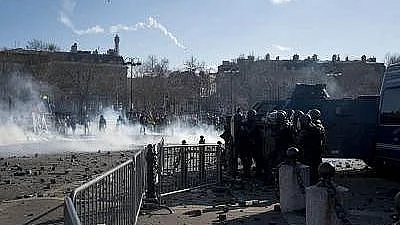Myanmar Coup: At Least 38 Killed in ‘Deadliest Day of Protest’
Security forces had opened live fire, tear gas, flash bangs and stun grenades on demonstrators in the recent days.

advertisement
In the deadliest day of violence since a military coup on 1 February, at least 38 people were killed on Wednesday, 3 March, in the ongoing protests in several towns and cities of Myanmar, the UN's Special Envoy to the country told a briefing on Wednesday, reported CNN.
Security forces had opened live fire, used tear gas, flash bangs and stun grenades on demonstrators.
After the military overthrew the elected government of Aung San Suu Kyi, neighbouring countries had called out to Myanmar for the bloodshed that ensued in several cities and towns of the country.
Youth activist Thinzar Shunlei Yi told Reuters via a messaging app that no words can describe the situation and the feelings. “It's horrific, it's a massacre.”
United Nations Special Envoy on Myanmar Christine Schraner Burgener said that more than 50 people died since the coup started and many are wounded.
"Today was the bloodiest day since the coup happened. Every tool available is needed now to stop this situation. We need a unity of the international community, so it's up to the member states to take the right measures," she was quoted by CNN as saying.
The US State Department spokesman Ned Price also said the United States was "appalled" by the increase in violence. “The administration of President Joe Biden was evaluating 'appropriate' measures to respond and any actions would be targeted at Myanmar's military,” he added.
The spokesman also said that the United States has conveyed to China that it is looking for Beijing to play a constructive role in Myanmar crisis.
The European Union said the shootings of unarmed civilians and medical workers were clear breaches of international law. By charging and arresting journalists, it also said that the military was stepping up repression of the media.
The Military Coup
The military declared a one-year state of emergency on 1 February, staging a coup right before the new Parliament – under the leadership of the National League of Democracy (NLD) – which was to convene its first session following their sweeping victory in November 2020. Aung San Suu Kyi and other senior figures were detained from the ruling party.
After nearly 50 years of military rule, the coup brought a halt to tentative steps towards democracy. It has drawn hundreds of thousands onto the streets and the condemnation of the international community.
(With inputs from CNN & Reuters.)